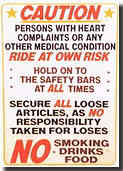Wednesday, September 27, 2006
Don't say milk say Brennan's
I was delighted yesterday to learn that an old "prose" piece was being rescued from the invisible purgatory of little magazine print & anthologized in a book. The title of this piece is "The Orson Welles Guide to the Afterlife." I'd forgotten about it, & if anyone had reminded me, I would've remembered that I'd written it, & published it, but not recalled where.
There's no clear border between my prose & poems. In fact, the poems aren't clearly separated from anything else I do except where I've decided or been forced to categorize creative output. I've embedded poems in prose, prose in poems, mixed both within radio programs, newspaper columns & webpages. I've made visual poems using collage, photograpy, & animated gifs. I've done aural poems with tape & warped records, limited only by lack of technological resources or training. My long poem "Boardwalk" is also a libretto & a boardwalk. None of this was "experimental." I have no original ideas.
As a child I was fascinated by the way language was presented:
Don't say
milk say
Bren nan's
The break in Brennan's was caused by the seam in the waxy cardboard milk carton. I recited it aloud over & over while eating KIX before going to school, then I read the cramped side of the cereal box the same way. At school I was flabbergasted not to say really annoyed by burned-out teachers who filled the blackboards (which as I advanced through the grades became green, then wipe-off white) with notes they copied from their notebooks & expected students to copy in turn into our notebooks. This was both stupid teaching & bad blackboard art. On the other hand, I liked when kids had to stay after school & write "I will not talk in class" 100 times on the board as punishment. The finished work was always there the next morning, then poof, was erased like words in the sand after a wave washed over them; you could still see something, a design, but you couldn't literally read it.
I was intrigued by news scrolling in one endless line across a sign in Times Square comprised of hundreds of small lightbulbs, even turning a corner. I could focus on a single moving word & not read anything following it. Or I raced ahead of the moving script, which took me, in a sense, into the past (or was it the future?). A ball bouncing from syllable to syllable on song lyrics in sing-a-long cartoons. Taken one syllable at a time, spoken or sung language is just sound. When written, there's the visual component, one's handwriting, the typography, line breaks, or how words fit into a larger visual scheme, like a roadside sign or a magazine advertisement. Some of the favorite lines of poetry I've written are the most plainly prosaic, which is exactly the effect I want them to have in the context of the poem, like the eye wandering across the detailed facade of a church & stopping on the neon-lit phrase, "Jesus saves." In the midst of the confusing pastiche of Shakespearian paraphrases & B movie references that comprise "The Orson Welles Guide," there's the line,"If Dick Clark gives you money, take it immediately to a gypsy!" The entire sentence is supposed to have the effect of the exclamation point concluding it: You can rest here for a moment but that doesn't mean you'll understand where the hell you are. Like the mysterious break between Bren & nan's.
"If a nation expects to be ignorant and free, in a state of civilization, it expects what never was and never will be." Thomas Jefferson
There's no clear border between my prose & poems. In fact, the poems aren't clearly separated from anything else I do except where I've decided or been forced to categorize creative output. I've embedded poems in prose, prose in poems, mixed both within radio programs, newspaper columns & webpages. I've made visual poems using collage, photograpy, & animated gifs. I've done aural poems with tape & warped records, limited only by lack of technological resources or training. My long poem "Boardwalk" is also a libretto & a boardwalk. None of this was "experimental." I have no original ideas.
As a child I was fascinated by the way language was presented:
Don't say
milk say
Bren nan's
The break in Brennan's was caused by the seam in the waxy cardboard milk carton. I recited it aloud over & over while eating KIX before going to school, then I read the cramped side of the cereal box the same way. At school I was flabbergasted not to say really annoyed by burned-out teachers who filled the blackboards (which as I advanced through the grades became green, then wipe-off white) with notes they copied from their notebooks & expected students to copy in turn into our notebooks. This was both stupid teaching & bad blackboard art. On the other hand, I liked when kids had to stay after school & write "I will not talk in class" 100 times on the board as punishment. The finished work was always there the next morning, then poof, was erased like words in the sand after a wave washed over them; you could still see something, a design, but you couldn't literally read it.
I was intrigued by news scrolling in one endless line across a sign in Times Square comprised of hundreds of small lightbulbs, even turning a corner. I could focus on a single moving word & not read anything following it. Or I raced ahead of the moving script, which took me, in a sense, into the past (or was it the future?). A ball bouncing from syllable to syllable on song lyrics in sing-a-long cartoons. Taken one syllable at a time, spoken or sung language is just sound. When written, there's the visual component, one's handwriting, the typography, line breaks, or how words fit into a larger visual scheme, like a roadside sign or a magazine advertisement. Some of the favorite lines of poetry I've written are the most plainly prosaic, which is exactly the effect I want them to have in the context of the poem, like the eye wandering across the detailed facade of a church & stopping on the neon-lit phrase, "Jesus saves." In the midst of the confusing pastiche of Shakespearian paraphrases & B movie references that comprise "The Orson Welles Guide," there's the line,"If Dick Clark gives you money, take it immediately to a gypsy!" The entire sentence is supposed to have the effect of the exclamation point concluding it: You can rest here for a moment but that doesn't mean you'll understand where the hell you are. Like the mysterious break between Bren & nan's.
Labels: about writing














